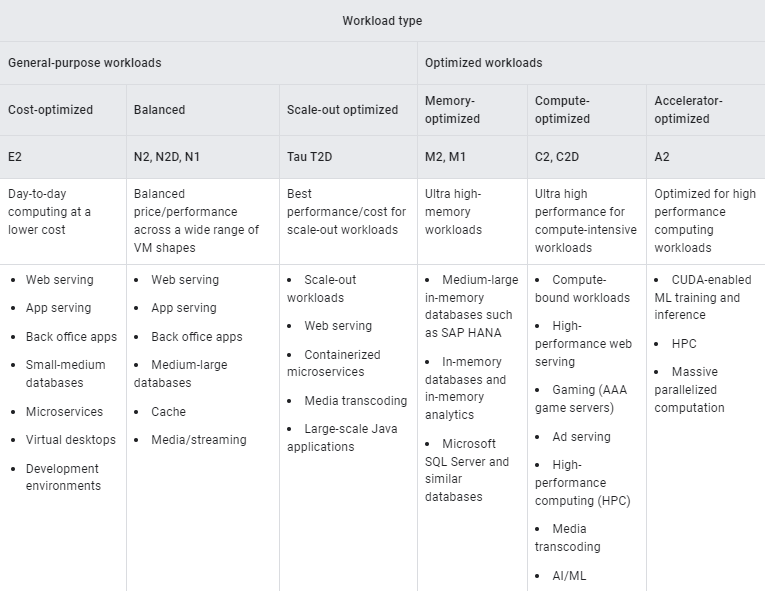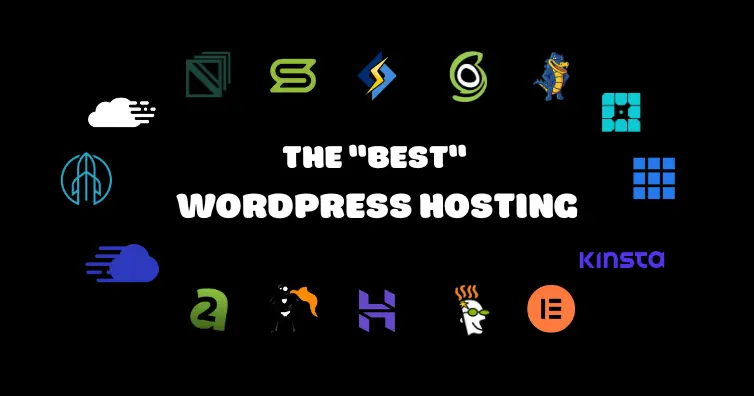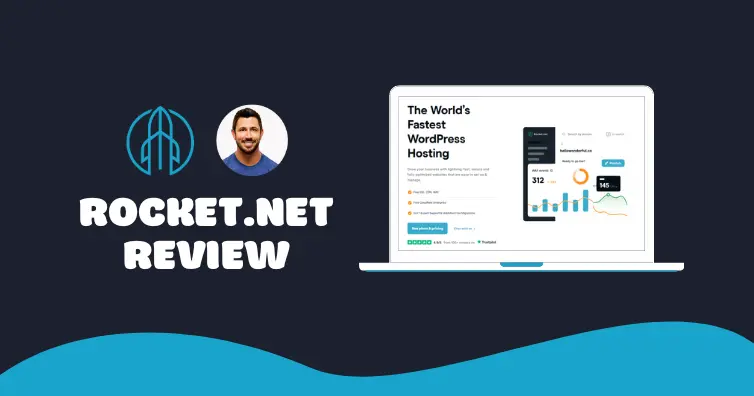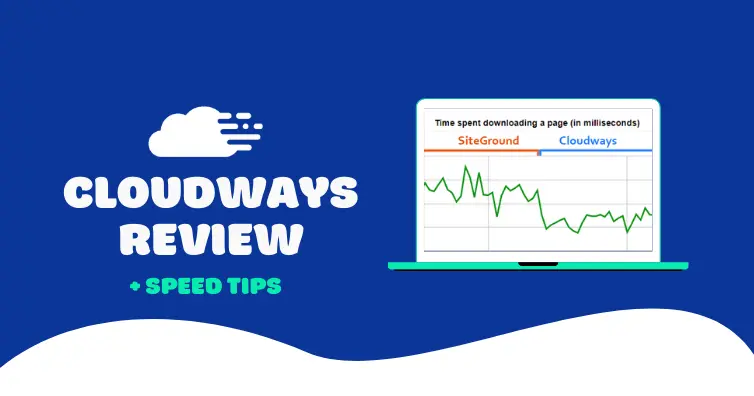
Looking for a WordPress host who uses Google Cloud?
Some hosts use Google Cloud exclusively (Kinsta, SiteGround, Elementor) while many control panels let you launch a server from multiple cloud hosting providers (RunCloud + SpinupWP), and Google Cloud is one choice. The first step is to decide if you want full-service managed WordPress hosting (which is usually a bit more pricey), or you just want to use a control panel.
Let me be clear: just because it’s Google doesn’t mean it’s the fastest. In fact, I would argue there are several faster (and more affordable) cloud hosts than Google like Vultr, DigitalOcean, or Rocket.net. Don’t get stuck paying an arm and a leg just because Google offers cloud hosting.
Machine Families
When choosing a WordPress host that uses Google Cloud, consider which machine family they use. Higher tier families (i.e. C2) perform better and should translate into a faster site compared to N2/N1 (most WordPress hosts use C2, N2, or N1). Kinsta, WP Engine, and Elementor all use the higher tier C2 family but they usually come with higher pricing. SiteGround and Closte use N2 (more of a mid-tier family) and Cloudways uses a low tier N1 family. Choose your host wisely.
There aren’t a lot of great Google Cloud hosts to be honest and many of these have major cons and aren’t the fastest hosts. But if you insist on Google Cloud, here’s the list.

| Host | Google Cloud Machine Family |
|---|---|
| 1. Closte | N2 |
| 2. Kinsta | C2 |
| 3. Elementor | C2 |
| 4. WP Engine | C2 |
| 5. SiteGround | N2 |
| 6. Cloudways | N1 |
| 7. Control Panels | N/A |
| 8. Google Cloud | N/A |
1. Closte (Mostly Google Cloud N2 + DNS + CDN)

Closte is powered by Google Cloud and is popular in the WP Speed Matters Facebook Group (Gijo is the admin and he wrote a Closte review).
Closte is cheap and is well-known for one thing (speed). It’s powered by Google Cloud DNS, Google Cloud CDN, and LiteSpeed. Google’s DNS and CDN are both very fast which you can see on cdnperf.com and dnsperf.com. The major downside is their support is extremely limited. My summary of Closte is very basic because that’s exactly what Closte is. It’s minimal and fast, but don’t expect managed WordPress hosting like you would on someone like Kinsta/GridPane.
Pros
- Cheap
- Solid security
- Fast + LiteSpeed
- Google DNS/CDN
Cons
- Very limited support
- It’s also not very helpful
- Hard to predict pricing
- Can’t use third-party CDN
2. Kinsta (Google Cloud C2)

The problem with Kinsta is even if they use Google Cloud hosting, they’re expensive when you look at how much CPU/RAM you get (12 CPU cores + 8GB RAM), $100/month for Redis, and very low monthly visit + PHP worker limits (especially since they don’t use full page caching from Cloudflare and count unknown bot visits). I definitely recommend Rocket.net instead of Kinsta.

Kinsta uses Google Cloud C2 (compute-optimized) VMs which are great for WooCommerce, high traffic, or resource-intensive websites. But again, the problem lies within Kinsta’s own limitations. They use Amazon Route 53 (Cloudflare is faster on dnsperf.com), and KinstaCDN which uses Cloudflare and server-side caching through their MU plugin. They’ve done multiple case studies for high traffic sites (including brands hosted on Shark Tank) and use their own custom, user-friendly MyKinsta dashboard, but it’s mostly superficial with aggressive marketing.
Pros
- Google Cloud C2
- Above average support
- Some CF Enterprise features
- Server caching via MU plugin
- Decent feedback in FB Groups
- Lots of case studies
Cons
- Low CPU/RAM
- PHP worker limits
- Monthly visit limits
- Redis is $100/mo
- No CF full page caching
- List of banned plugins
3. Elementor (Google Cloud C2)

Elementor’s Google Cloud hosting is relatively new.
Even though it’s cheap at $99/year, I was surprised to hear they use Google Cloud C2. It also comes with Elementor Pro, support, and basic features like backups, SSL, etc. I haven’t gotten a chance to test it out yet, but I’ve been hearing it’s actually not that good. Just going off hearsay.

4. WP Engine (Google Cloud C2)

WP Engine also uses Google Cloud C2.
WP Engine is backed by hundreds of million in dollars of VC money which isn’t really a good thing IMO. They make bold claims likew saying they’re the “unequivocal performance leader in WordPress” which is totally not true. They use the same Google Cloud C2 machine family as Kinsta, their support is worse, and many people already migrated from WP Engine to Kinsta and posted faster load times. When comparing Kinsta vs. WP Engine, Kinsta wins in terms of speed, support, TrustPilot reviews, and the dashboard is cleaner. But again, I don’t recommend either.
Pros
- Google Cloud C2
- Server-side caching
- Well-known company
- Backed by million of dollars
Cons
- False claims
- Worse support
- Banned plugins
- Bad TrustPilot reviews
5. SiteGround (Google Cloud N2)

SiteGround moved to Google Cloud N1 servers in 2020 and told customers how much faster their sites would be, but they got countless complaints about their slow TTFB (and were the slowest host in Backlinko’s PageSpeed test). The decided to moved to Google Cloud N2 to stop the bleeding, but I wouldn’t trust their company because everything they do is glorified by their team and they cover up tracks when they make a mistake, rarely (if ever) admitting to anything.
I left SiteGround in 2019 for Cloudways not because of their slow TTFB, but they’ve gone downhill in many ways (reducing support, increasing prices, CPU limits, banning countries, and cutting costs by reducing number of websites on each plan). It seems SiteGround only cares about money now and I stopped recommending them all together with zero affiliate links to their website on my blog. SiteGround is also unethical since their community manager and affiliates are admins of several Facebook Groups and prevent bad reviews by removing posts and threatening people who write negative reviews. Not a good pick for Google Cloud hosting.
Pros
- Solid security
- Server-side caching
- SiteGround Optimizer
- Good TrustPilot rating
- Large team behind them
Cons
- Unethical
- Slow TTFB
- Bad CPU limits
- Support got worse
- Google blocked their DNS
6. Cloudways (Google Cloud N1)

Cloudways offers Google Cloud hosting, but most people (including me) use Vultr HF.
On Cloudways, you launch a server from one of 5 cloud hosting providers (Google Cloud is just one choice). Although Cloudways is great for websites on a budget since DigitalOcean starts at just $10/month, their Google Cloud WordPress hosting can get expensive. That’s because they basically resell it and mark up the price even as you scale up. But they have many caching layers like Redis + Varnish and are very easy to try with 3-day trials, free migrations, and a promo code that gives you 30% off your first 2 months. I usually only recommend Cloudways for Vultr and DigitalOcean, but since they’re easy to try, it’s worth a shot. They have great TrustPilot reviews.
Pros
- Cloudflare Enterprise
- Object cache pro
- Many caching layers
- Free migration + 3-day trial
- Great feedback in FB Groups
Cons
- N1 servers
- Gets expensive
- No file manager
- No email hosting
- Verification issues
7. Control Panels To Connect A Google Cloud Instance
This is my #1 recommendation but since these are more control panels than hosting, it’s #7.
The following are control panels that let you create a Google Cloud compute engine instance and connect it to their control panel for easier management. Some have different levels of caching, support, backup systems, LiteSpeed etc. So it really depends on each one’s fine details.
RunCloud

RunCloud is a control panel with Google Cloud WordPress hosting.
It’s a popular (and cheaper) option in Facebook Groups. The control panel itself starts at $6.67/mo, then you only pay the base price of Google Cloud (around $12.71/month). So instead of having to constantly pay more as you scale up like you would on most hosts, you only pay the base price of Google Cloud plus the cost of the control panel. This results in a lot of cost savings. WP Johnny wrote a nice RunCloud review where he explains the pros/cons of using RunCloud.
Pros
- Cheap
- Nice UI
- FastCGI caching
- Many developer features
Cons
- No phpMyAdmin
- Not for beginners
- Support isn’t great
- Overwhelming features
SpinupWP
SpinupWP is another control panel offering Google Cloud hosting.
Unlike some control panels, SpinupWP takes care of most things for you. They install the software, tune it, configure SSL, cron jobs, and caching rules. They also use the latest packages of Nginx, PHP, MySQL/MariaDB, and Redis. However, one review on their TrustPilot profile says their Google Cloud servers aren’t reliable. Pricing is more expensive than most control panels, probably because they install the software and do a few things the other panels don’t.
Pros
- Simple, but empty
- Automatic tuning
- Automatic installation
- Latest software packages
Cons
- No support
- Pricer than most panels
- Reports it can be unreliable
- No file manager/phpmyadmin
GridPane
GridPane offers Google cloud hosting and is run by Patrick Gallagher.
They don’t have an affiliate program which is why some people haven’t heard of them, but they’re very popular in Facebook Groups (and Patrick knows his stuff). They use LiteSpeed, Redis, and one of the fastest stacks in this list. A big problem with Kinsta and other Google Cloud hosts is they get expensive as you scale up, but that’s not the case with GridPane. For high traffic sites that become expensive, GridPane is popular and cheaper than other options.
Pros
- LiteSpeed
- Great support
- White-label option
- Fast stack + tuning
Cons
- Expensive to start
- Limited payment options
- Wp Johnny prefers RunCloud
- Founder isn’t a very “nice” guy
ServerPilot
ServerPilot is another control panel with Google Cloud hosting and solid TrustPilot reviews.
Support is much better than most control panels and the interface is clean, yet still lets you do pretty much anything (see the features page). Pricing starts at $5/server + $0.50/app which is cheap compared to most options in this list. They also have documentation for getting started.
Pros
- Great support
- AutoSSL on paid plans
- Sets up needed software
- Managed software updates
Cons
- No Redis/memcached
- Firewall is very basic
- Paid plans are per server
- Staging requires workaround
8. Google Cloud (Direct)
Finally, you can get hosting directly from Google Cloud.
Tony (from Tony Teaches Tech) made a great YouTube tutorial on it, but it’s definitely more hands on and I only suggest doing this if you’re a developer who knows what they’re doing. While it’s cheap and directly from Google, it doesn’t include support and other features most hosts would include. So feel free to dive in, otherwise I recommend one of the other choices.

Which WordPress host offers Google Cloud?
Kinsta, WP Engine, Elementor, Closte, SiteGround, and Cloudways all offer Google Cloud hosting from different machine families (C2, N2, N1). Several control panels also let you launch a Google Cloud instance.
Which WordPress host uses the Google Cloud C2 machine family?
Kinsta, Elementor's cloud hosting, and WP Engine offer Google Cloud hosting from the C2 machine family which outperforms lower tiers such as N2 and N1.
Host do I host WordPress on Google Cloud?
To host a WordPress website on Google Cloud, you can sign up for a host that has Google Cloud built-in, or launch a Google instance from a control panel like RunCloud/SpinupWP.
I hope this was helpful! I don’t run Google Cloud on my WordPress site so I’ll be the first to admit I’m not an expert with it, but just wanted to give you a few options you can choose from.
Cheers,
Tom




